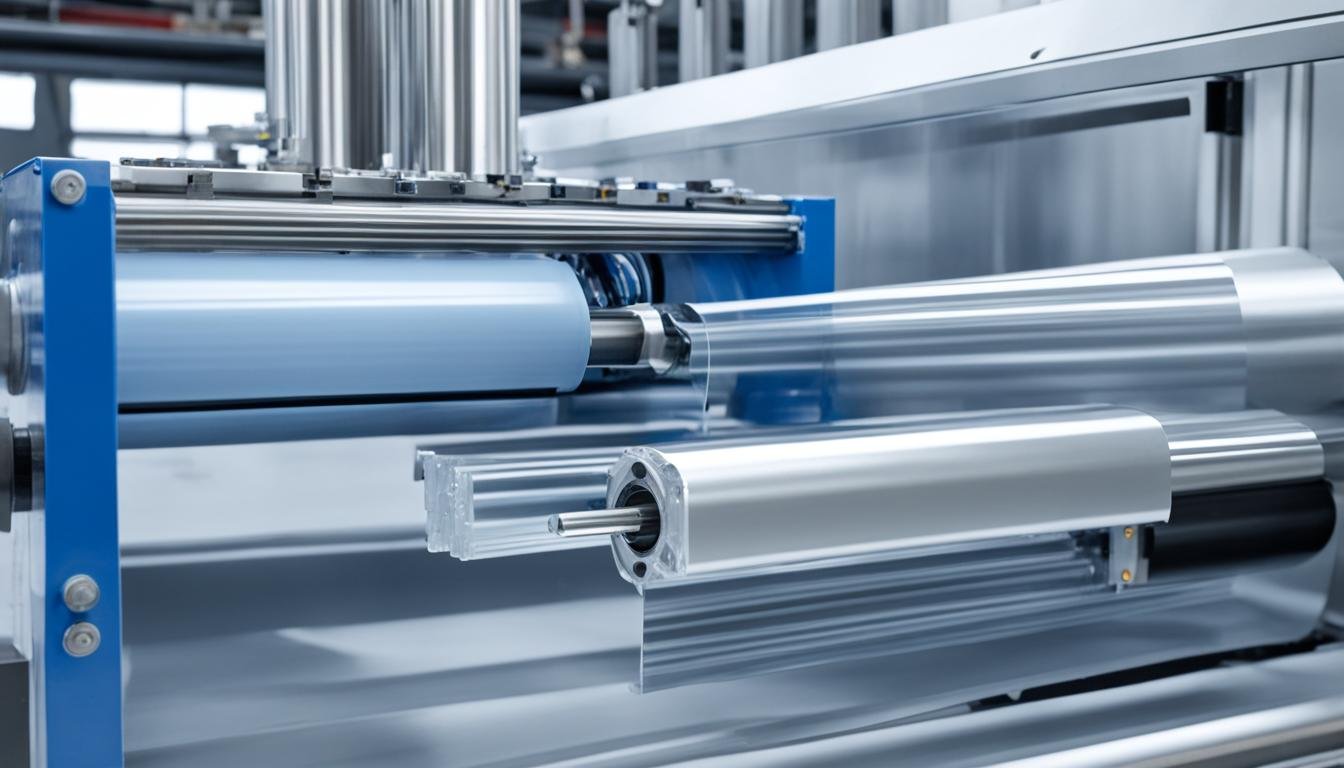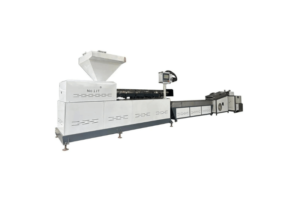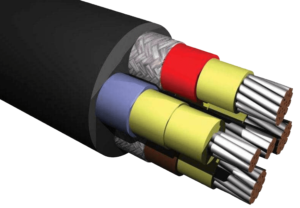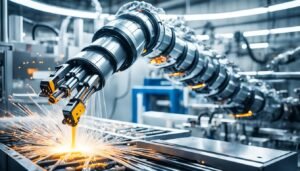Antecs is a key player in the plastic extrusion world. They focus on making plastic extrusion solutions that are reliable and efficient. Their plastic extruders are high-quality, improving production and giving clients consistent results. Antecs’s skill in polymer extrusion and extrusion technology helps them create top-notch extrusion equipment for the plastic industry’s needs.
Custom solutions are vital in the plastic manufacturing field, and Antecs understands this well. They work closely with clients to make solutions that meet their unique needs. With expertise in plastic molding, thermoplastic extrusion, and other areas, Antecs designs and makes extruder machines that are top performers and reliable.
Antecs uses the latest extrusion technology and top-notch extruder components in their plastic extruders. This approach ensures superior outcomes every time. Their focus on innovation and getting better all the time keeps them leading in the extrusion process. They offer cutting-edge solutions that make work more productive and efficient for clients.
Key Takeaways
- Antecs offers reliable and efficient plastic extrusion solutions.
- The company specializes in designing and developing high-quality plastic extruders.
- Antecs delivers innovative technologies and durable products to meet the highest requirements of the plastics industry.
- Customized solutions are available to cater to specific client needs and requirements.
- Advanced extrusion technology and high-quality extruder components ensure superior results.
Introduction to Plastic Extrusion
Plastic extrusion is a method that makes many plastic items. It pushes hot plastic through a shape to make long parts with a set size. This includes things like tubes, films, and wires. To work right, the process needs careful control of temperature. It uses several temperature controllers to make sure the plastic heats up the way it should.
What is Plastic Extrusion?
Plastic extrusion makes things with one shape by pushing melted plastic through a form. Unlike making things with molds, this method can go on without stopping. It starts with plastic beads that melt as they move through the machine. The heat isn’t always the same everywhere in the machine, which affects the material’s properties.
This method has many types for making different items:
- Tubing extrusion makes tubes and pipes, which then cool with water.
- Blow film extrusion is for plastic film tubes, which grow bigger as they cool.
- Sheet film extrusion creates plastic sheets or films that cool on big rolls.
- Over jacket extrusion coats wires with plastic in different ways.
Importance of Plastic Extrusion in Various Industries
Plastic extrusion is key for making parts across many fields. It’s used in making car parts, food containers, and more. Industries like automotive, food, and construction use it a lot. It even helps make medical devices and electronics safer and more functional.
| Industry | Applications |
|---|---|
| Automotive | Interior trim, exterior moldings, hoses, seals |
| Food and Beverage | Packaging films, containers, tubing |
| Construction | Pipes, window profiles, siding, decking |
| Medical | Tubing, catheters, medical device components |
| Electrical and Electronics | Wire insulation, cable jacketing, housings |
Its many types and the many plastic materials it can use make it very important. Without it, we wouldn’t have many of the products we use every day. Plastic extrusion helps in many areas, from industry to healthcare, by making custom parts at a large scale.
Benefits of Using a Plastic Extruder
Getting a plastic extruder holds many pluses for makers in fields like medicine, cars, buildings, electronics, as well as food and drinks. With top-notch extrusion tech, firms can maintain quality consistently. They can also work faster, smarter, and save a lot of money.
Improved Product Quality
Plastic extruders make sure your products are top-notch. They create even shapes with the same inside areas. This means your products will be just right every time. You can also change their thickness, textures, colors, and add stuff to make them better.
Increased Production Efficiency
With a plastic extruder, companies can speed up how fast they make things. The extrusion process has a few steps, like getting materials ready and checking the quality of the final product. Doing all this well means they can make things faster and better meet customer needs.
Cost-Effectiveness
Plastic extruders can save companies a lot of money. They waste less, use up less energy, and make the most of their materials. Making things with plastic is usually cheaper than with metal or wood. And because plastic is light, shipping and installing products are also more affordable.
| Benefit | Description |
|---|---|
| Versatility | Plastic extrusion allows for the production of tubes, pipes, sheets, profiles, films, and custom shapes, catering to diverse industry needs. |
| Customization | Plastic extrusions can be produced in a wide range of shapes and sizes, enabling high customization to meet specific project requirements. |
| Durability | Plastic extrusions are resistant to corrosion, moisture, and chemicals, reducing the need for frequent repairs or replacements. |
| Insulation Properties | Plastic extrusions have good insulating properties, making them effective for energy-efficient building designs and reducing environmental impact when made with recycled materials. |
| Ease of Fabrication | Plastic extrusions are easy to cut, drill, and shape, allowing for efficient fabrication and installation processes. |
Making use of plastic extruders can make a company’s production smoother, improve product quality, and lower costs. Antecs offers the latest in plastic extrusion tech. This helps businesses gain these benefits and stay competitive.
Types of Plastic Extruders
Plastic extruders are key in making many items like pipes, window frames, and plastic films. They meet different needs with unique types. This lets manufacturers choose the right one for their products.
Single Screw Extruders
Single screw extruders are very common. They work with plastic types like PE, polypropylene, and more. A single screw moves in a barrel, melting and mixing the plastic with heat.
The screw has different parts like the feed and melting zones. Its length to diameter ratio is crucial for good mixing. It usually ranges from 25:1 to 40:1.
Twin Screw Extruders
Twin screw extruders handle tougher jobs better than single screw ones. They mix plastic more efficiently due to their two rotating screws.
These extruders work well with materials that have additives. They’re often used for making high-quality plastics and medical materials.
Specialized Extruders for Specific Applications
There are also extruders made for certain products or plastic blends. Some examples are:
- Co-extruders: Create multi-layer products or mix different plastics in one step.
- Blown film extruders: These are for thin plastic films. Hot plastic is ‘blown’ into a bubble and then flattened.
- Tubing extruders: They make pipes, tubes, and hoses with precision.
- Over-jacketing extruders: For adding insulation to wires, with the right amount of adhesion.
| Extruder Type | Key Features | Typical Applications |
|---|---|---|
| Single Screw Extruder | Simple design, suitable for a wide range of thermoplastics | Pipes, profiles, sheets, films |
| Twin Screw Extruder | Enhanced mixing, higher output rates, suitable for complex materials | Specialty compounds, reactive extrusion |
| Co-extruder | Combines multiple materials in a single extrusion process | Multi-layer films, multi-material components |
| Blown Film Extruder | Produces thin plastic films using air pressure and rollers | Food packaging, shopping bags |
| Tubing Extruder | Specialized for producing pipes, tubes, and hoses | Plumbing, medical tubing, industrial hoses |
| Over-jacketing Extruder | Applies insulation or protective layers over substrates | Insulated wires, cables, jacketed products |
The choice of plastic extruder type depends on the specific production requirements, material properties, and desired end products. Antecs offers a wide range of plastic extruders, including single screw extruders, twin screw extruders, and specialized extrusion equipment, to meet the diverse needs of the plastics industry.
Learning about plastic extruders helps manufacturers pick the best one for their needs. This leads to better production of plastic items.
Key Components of a Plastic Extruder
A plastic extruder is a machine made of many important parts. These parts work together to make sure the plastic comes out just right. It’s important to know how each part works to make the best products.
The main part of a plastic extruder is the screw inside it. This screw moves, melts, and pushes the plastic through the machine. The size and shape of the screw affect how much plastic you can use and how well it melts. The barrel where the screw is found is usually 15 to 30 times longer than it is wide. This helps heat and melt the plastic evenly.
The barrel is like a tube and is usually made of very strong steel. It holds the screw and gets hot to melt the plastic. At the start of the machine, there’s a hopper that drops plastic into the extruder. The hopper often has a cutter to adjust the amount and flow of plastic.
The kneading system of a plastic extruder includes the screw, barrel, hopper, head, and mold. They work together to shape the plastic.
The die shapes the melted plastic as it comes out the extruder. It gives the plastic its final form. The core and sleeves around it make a special space for the plastic to travel. This space helps the plastic cool and form the right shape. The head changes the melted plastic into the shape you want.
| Component | Function |
|---|---|
| Drive System | Powers the rotation of the extruder screw |
| Heating Elements | Provide heat to melt the plastic material |
| Cooling System | Cools the extruded product after it exits the die |
Here are some more important parts of the plastic extruder:
- Drive system: Powers the rotation of the extruder screw
- Heating elements: Provide heat to melt the plastic material
- Cooling system: Cools the extruded product after it exits the die
Your plastic extruder might also have a shunt sleeve to guide the plastic. Special tools for the mold help keep the plastic’s shape just right. Working together on the design and making of the machine is key for good results.
Understanding each part of a plastic extruder is key for making great products all the time.
Extrusion Process Overview
The plastic extrusion process is a way to make a lot of plastic goods like pipes, tubes, and films. It uses raw plastic and turns it into shapes we need. There are many steps in this process, and each one is key to making the final product.
Feeding and Melting
First, the plastic materials are fed into a machine called an extruder. The plastics, like pellets or powders, go into a hopper. From there, a screw moves them into a heating barrel. Inside the barrel, the plastic heats up to between 200 and 275 degrees, which makes it melt smoothly. This careful heating ensures the plastic is the right thickness throughout.
Shaping and Cooling
Next, the molten plastic is forced through a die. Pressure can be as high as 34 MPa to give it its final shape, like tubes or sheets. As it comes out, it cools quickly to keep the shape. The cooling method changes based on what kind of plastic is being made:
- In tubing extrusion, the tubes or pipes are typically water-cooled after exiting the die.
- Blow film extrusion, used for producing plastic film tubes for products like shopping bags, involves cooling the extruded film with air.
- Sheet film extrusion, applied for thicker plastic sheets or films, utilizes a series of cooling rolls to solidify the extruded product.
Cutting and Finishing
After cooling, the plastic is cut and finished. It can be cut in different ways, like with a saw or a hot knife. The way it’s cut depends on what it’s going to be. Then it gets its final touches, like printing or protecting the surface.
Plastic extrusion is great because it can make a lot of things quickly and accurately. It’s used in cars, buildings, packages, and more because it can be shaped to fit many needs.
Materials Used in Plastic Extrusion
Plastic extruders work with many types of thermoplastics. Each has its own unique features and uses. Antecs provides extrusion solutions. They meet the needs of different industries using various plastic materials.
Common Thermoplastics for Extrusion
Many thermoplastics are used in extrusion. Some common ones are:
- Low-density polyethylene (LDPE): Ideal for applications needing flexibility and impact resistance because it’s lightweight.
- High-density polyethylene (HDPE): It offers durability and strength due to its rigidity.
- Polyvinyl chloride (PVC): It’s rigid type is in construction, while flexible PVC is in different other areas.
- Polypropylene (PP): It can be made stronger with glass or carbon fibers and is used in many applications.
- Polystyrene: Used for its clarity and stiffness in packaging and disposable goods.
- Butyrate: It stands out with great impact and chemical resistance, good for auto and industry use.
- Polyethylene terephthalate glycol-modified (PETG): A tough, clear material for various extrusion needs.
Besides these, you’ll find engineering plastics like TPE, PC, PA, and ABS for their advanced features.
Additives and Fillers
To make plastic products better, we add different things in extrusion, like:
- UV stabilizers: They keep the plastic safe from sun damage.
- Colorants: Used to give the products any color, including special effects.
- Reinforcing fibers: Glass or carbon fibers make the parts stronger and more stable.
- Flame retardants: These improve the plastic’s resistance to fire, keeping things safe.
- Impact modifiers: They toughen the products, especially in cold weather.
- Lubricants: Make the extrusion process smoother, the products better looking, and improve workability.
| Material | Properties | Applications |
|---|---|---|
| LDPE | Lightweight, flexible, impact resistant | Packaging films, squeeze bottles, toys |
| HDPE | Rigid, high strength-to-weight ratio, durable | Pipes, automotive fuel tanks, cutting boards |
| PVC | Rigid or flexible, chemical resistant, insulating | Window profiles, pipes, wire insulation, medical tubing |
| PP | Lightweight, heat resistant, chemical resistant | Automotive parts, food packaging, textiles |
| Polystyrene | Clear, stiff, easily processed | Disposable cutlery, CD cases, packaging foam |
| Butyrate | Impact resistant, dimensionally stable, chemical resistant | Tool handles, automotive trim, pens |
| PETG | Clear, tough, easily processed | Medical devices, food containers, signs |
With the right mix of materials and additives, Antecs helps make top-quality extruded products. These products are tailored to specific needs.
Plastic Extruder – Customizable Solutions
At Antecs, we know each manufacturing process is different. This is why we create customized plastic extruders for your specific needs. Our skilled design team works with you to craft tailored extrusion solutions. These solutions make your production smooth and meet your product goals.
We have been in the custom plastics extrusion business for over 43 years. This experience lets us offer custom profile extrusions. Our extruders can handle over 2,500 lbs/hr, ensuring great efficiency. Plus, we can match any color you want for your product.
Tailored Designs for Specific Requirements
We at Antecs can customize our extruders to fit your unique needs. Our expertise in materials and design allows us to create the perfect solution. We offer a variety of extruded products, from foamed to co-extruded profiles.
Our extruders have special screw designs for the best performance. They have L/D ratios from 20/1 to 30/1. This means they can process materials very effectively.
Flexibility in Product Shapes and Sizes
Our plastic extruders at Antecs are very flexible. We can make diverse product profiles and sizes. Even complex designs are possible. Our seven lamination stations enhance our ability to create versatile product designs.
| Service | Description |
|---|---|
| Engineering Design Services | We offer engineering design services and 3D printing for prototypes. This ensures your custom extrusion fits your exact needs. |
| Post-Extrusion Processes | We provide many post-extrusion processes, like cutting, laminating, and printing. Our services make your products stand out. |
| Custom Packaging Solutions | Need custom packaging? We’ve got you covered. We make packaging that protects and showcases your extruded products well. |
| Inventory Management Services | Our inventory services keep your custom extruded products in stock. This makes your operations run smoothly. |
We work across industries like aerospace, healthcare, and automotive at Antecs. Our experienced team is ready to meet your customized plastic extruders needs. Get in touch with us at (603) 446-6916 to see how we can improve your manufacturing process.
Advantages of Antecs Plastic Extruders
Antecs plastic extruders stand out through their unique benefits. They focus on the latest extrusion technology, reliable performance, and long-lasting construction. These factors make Antecs a leading brand in the plastics field.
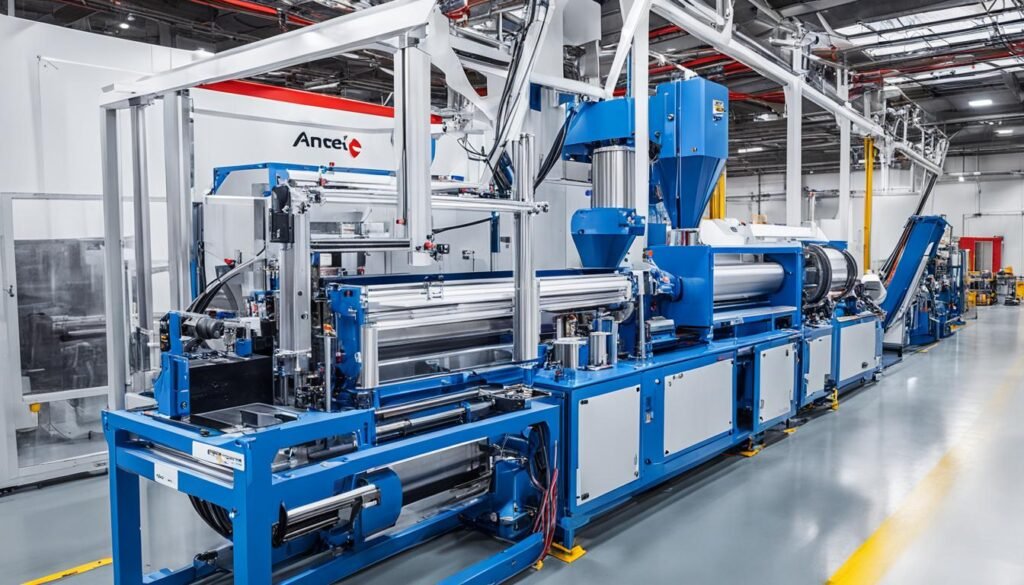
State-of-the-Art Technology
Antecs uses cutting-edge technology in their machines to boost performance and productivity. Here are some important features:
- Advanced control systems for precise parameter adjustment and process monitoring
- Energy-efficient designs that reduce power consumption and minimize environmental impact
- Innovative screw and barrel configurations for improved mixing and output quality
- Integration of Industry 4.0 principles for enhanced automation and data-driven decision making
Robust and Durable Construction
Antecs’ extruders are designed for long-term use, thanks to their sturdy build. They use top-notch materials and components, like:
| Component | Material | Benefit |
|---|---|---|
| Screw and Barrel | High-grade steel alloys | Resistance to wear and corrosion |
| Gearbox | Hardened steel gears | Smooth power transmission and long service life |
| Heating Elements | High-quality ceramic heaters | Efficient and uniform heating, reduced energy consumption |
| Frame and Structure | Heavy-duty steel construction | Vibration damping and stability during operation |
This robust design also cuts down on maintenance and ownership costs. This makes Antecs’ extruders a smart buy for plastic makers.
Exceptional Customer Support
Antecs doesn’t just sell machines; they offer top-notch support too. This includes help from start to finish, with services like:
- Pre-sales consultation and customization assistance
- Installation and commissioning support
- Operator training and technical documentation
- After-sales maintenance and spare parts support
- Continuous technical assistance and troubleshooting
Their engineering and support teams collaborate closely with clients. Their goal is to meet specific needs and ensure the best machine performance. This customer-centric approach makes Antecs a trusted partner in the plastics industry.
“Antecs has been a trusted supplier of plastic extrusion equipment for our company for over a decade. Their state-of-the-art technology, robust construction, and exceptional customer support have been instrumental in our success and growth in the industry.”
– John Smith, Production Manager, ABC Plastics Inc.
Choosing Antecs means benefiting from top extrusion technology, reliable performance, sturdy construction, and unmatched support. This helps manufacturers reach their production targets and maintain competitiveness in the plastics sector.
Applications of Extruded Plastic Products
Extruded plastic products are now a key part of our daily lives, used in many industries. They are found in everything from automotive parts to food wraps and construction materials. Extruded plastics are important for how our world looks and works.
In cars, extruded plastics are everywhere, from the inside to the bumpers. They’re in trim parts, seals, hoses, and more. Their durability and flexibility help make cars lighter, more efficient, and good-looking.
The food industry depends on extruded plastics for safe packaging. Containers, bottles, and wraps keep our food fresh and clean. The special properties of these plastics, such as guarding against moisture and contamination, are essential for food storage.
Healthcare benefits a lot from extruded plastics too. They are used in surgical tools, implants, and more. The plastics’ ability to be sterile and their precision matters a lot in medicine.
Extruded plastics are used in making buildings as well. They help with windows, doors, and more. These materials help buildings stay warm, insulated, and easy to care for.
Extruded plastics have truly changed how we make and use things every day. Their adaptability, reliability, and affordability have made them essential in several fields.
They’re also in common items like toys and home goods. Through extrusion, these plastics can take many shapes. This means we have a lot of neat and useful items.
They play a big role in industrial machinery too. Things like conveyor belts and gears need their strength. These plastics can handle the tough jobs.
| Industry | Extruded Plastic Applications |
|---|---|
| Automotive | Trim pieces, seals, hoses |
| Food Packaging | Containers, bottles, tubing, films |
| Medical Devices | Surgical instruments, implants, drug delivery systems |
| Construction Materials | Window frames, door frames, siding, pipes, conduits |
| Consumer Goods | Household items, toys, sporting equipment |
| Industrial Products | Machine parts, conveyor belts, gears, bearings |
The use of extruded plastics shows their variety and key role in modern manufacturing. As we make advancements, their place in different sectors also grows. This path of innovation is the future of how we make things.
Maintenance and Troubleshooting of Plastic Extruders
Keeping plastic extruders in top shape requires regular upkeep. Antecs stresses the need for preventive maintenance. This approach minimizes downtime and keeps production on track. With the right care, extrusion equipment can last longer, dodge pricey repairs, and work smoothly.
Regular Maintenance Practices
Preventive maintenance is the cornerstone of smooth operation for plastic extruders. It involves routine cleaning, proper lubrication, and checking critical parts like the screw, barrel, and die. These steps prevent problems such as wear on the screw, die clogs, and heating issues. Here’s what you should do regularly:
- Clean barrel fans and heaters often to stop debris and resin from building up
- Change gearbox oil as needed and look for signs of trouble like metal in the oil
- Ensure all wires and relays in the control panel are tightly connected
- Check that the breaker plate forms a good, flat seal
- Measure the barrels and screws sometimes, depending on the materials used and how much the machine’s run
On average, manufacturers lose about 30 percent of their production time due to maintenance. In the car industry, a minute of downtime can cost as much as $20,000, equal to $1.2 million an hour.
Common Issues and Solutions
Problems can still pop up, even with regular care. When they do, quick action is crucial to keeping downtime minimal. Here are a few common problems and solutions:
- Screw Wear: The life of an extruder screw and barrel varies. Closer barrel clearance is better. Yet, too much can slow down production in bigger machines. This might mean turning the screw faster to keep up with demand.
- Die Blockage: Regular die inspection and cleaning can prevent this issue. Make sure the temperature and material flow are right to avoid clogs.
- Temperature Control Issues: Watch melt pressure, machine and material temperatures, heater power, and more. Store resin in a clean, steady environment to prevent issues from starting.
| Extruder Size | Output (kg/hr) |
|---|---|
| 1-inch | 4.5 |
| 2-inch | 36 |
| 4.5-inch | 430 |
| 6-inch | 980 |
Knowing how to troubleshoot and maintain your machine matters. Timely action and smart maintenance can cut downtime. Switching from a time-based to a run-time maintenance schedule can save money. Using tools like run hour meters and vibration sensors, and linking your machines to CMM software, can make maintenance easier.
Regular maintenance and quick responses to problems are essential. They keep your machine working right, lower downtime, and boost its efficiency.
Innovations in Plastic Extrusion Technology
The plastic extrusion industry has seen big improvements. They aim for energy efficiency, sustainability, and better process control. These changes have made the way we make plastic products better. Now, we can produce items that are high-quality, consistent, and cost less. This benefits many sectors.
Energy-Efficient Designs
Energy efficiency is a major goal in plastic extrusion. Top companies like KraussMaffei, Coperion, and Davis-Standard are at the forefront. They’ve created machines that use less power and are greener. Their work includes:
- Cooling systems that are smarter, wasting less energy
- Precise temperature control for steady conditions, saving energy
- Lighter parts that use less energy
- A way to reuse waste heat in the process
By using these green designs, plastic extrusion firms cut costs. They also help the environment more.
Advanced Process Control Systems
Taking control of the process is another way plastic extrusion has grown. Now, we use real-time monitoring, data analytics, and control loops for better quality. Some of the cool tech includes:
- Smart sensors watching important factors like temperature
- Feedback loops that adjust things based on sensor info, keeping quality high
- Algorithms that look for trends and suggest how to keep improving
- Using Industry 4.0 to help machines and people work together better
This high-tech process control lets plastic extrusion companies make more accurate and repeatable products. It also means less waste and lower need for manual work.
| Innovation | Benefits |
|---|---|
| Multi-layer extrusion technology | Improved layer adhesion, better barrier properties, and product consistency |
| Incorporation of functional layers | Extended product shelf life and performance |
| Foamed plastic extrusion advancements | Excellent thermal insulation properties and lightweight construction materials |
| Precision extrusion technologies | Production of micro-sized and miniature plastic parts for medical devices, electronics, and optics industries |
| Innovative die designs | Increased flexibility, quick adjustments, and reduced setup times |
The new innovations in plastic extrusion are a game-changer. They boost efficiency and sustainability, and open doors for new plastic parts in different fields. This includes cars, planes, health care, and products we all use every day.
Choosing the Right Plastic Extruder Manufacturer
Finding the right plastic extruder manufacturer is crucial for your success. It’s vital to consider several factors. This ensures you partner with a team that meets your needs and offers top-notch solutions.
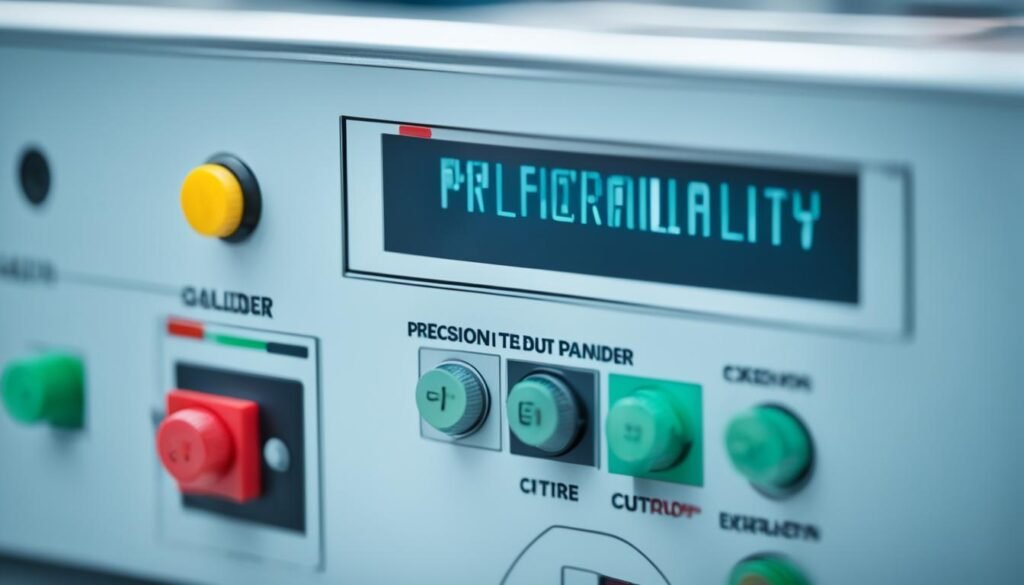
Technical expertise is a key point to look for. A company should be well-known for making advanced extrusion systems. For instance, Antecs designs cutting-edge extruders. They are proud of their technology that helps in better production and product quality.
Great customer support is also important. The manufacturer should offer help like advice, installation, training, and ongoing support. Antecs stands out for their top-notch customer service. They make sure each client gets what they need for success.
Ability to customize equipment is crucial too. Since every operation is different, it helps to be able to tweak equipment. This is something Antecs is great at. They offer plenty of ways to tailor extrusion systems to specific needs.
| Factor | Importance |
|---|---|
| Technical Expertise | Ensures access to advanced technologies and optimized extrusion processes |
| Customer Support | Provides comprehensive assistance throughout the equipment lifecycle |
| Customization Capabilities | Allows for tailored solutions that meet specific production requirements |
Assessing manufacturers by these criteria helps you decide wisely. Choosing well can boost your production and keep you ahead in the market. Antecs is known for their dependable, efficient, and customizable extrusion solutions. They are a great choice for businesses aiming to enhance their plastic extrusion processes.
Conclusion
In conclusion, plastic extruders are key for making plastic products efficiently. They are used in many industries. Antecs is a top provider of these machines, offering advanced technology and options to fit different needs.
Choosing Antecs means better product quality and more efficient production. Their focus on innovation and meeting customer needs ensures the best service. This helps companies in the plastics business be successful.
Antecs keeps up with the plastic industry’s changes by creating new solutions. They work hard to help manufacturers improve their plastic-making processes. This effort supports success in the market.





